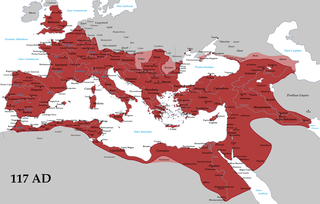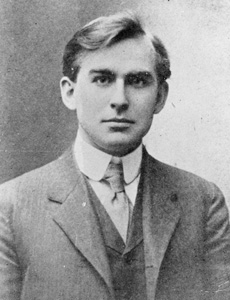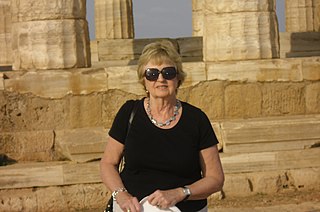Related Research Articles

The Roman Empire was the post-Republican state of ancient Rome and is generally understood to mean the period and territory ruled by the Romans following Octavian's assumption of sole rule under the Principate in 31 BC. It included territory in Europe, North Africa, and Western Asia, and was ruled by emperors. The fall of the Western Roman Empire in 476 conventionally marks the end of classical antiquity and the beginning of the Middle Ages.
The Battle of Naissus was the defeat of a Gothic coalition by the Roman Empire under Emperor Gallienus and the future Emperor Aurelian near Naissus. The events around the invasion and the battle are an important part of the history of the Crisis of the Third Century.

Eugenius was a usurper in the Western Roman Empire (392–394) against Emperor Theodosius I. While Christian himself, Eugenius capitalized on the discontent in the West caused by Theodosius' religious policies targeting pagans. He renovated the pagan Temple of Venus and Roma and restored the Altar of Victory after continued petitions from the Roman Senate. Eugenius replaced Theodosius' administrators with men loyal to him including pagans. This revived the pagan cause. His army fought the army of Theodosius at the Battle of the Frigidus, where he was captured and executed.
Erich Stephen Gruen is an American classicist and ancient historian. He was the Gladys Rehard Wood Professor of History and Classics at the University of California, Berkeley, where he taught full-time from 1966 until 2008. He served as president of the American Philological Association in 1992.
Richard John Alexander Talbert is a British-American contemporary ancient historian and classicist on the faculty of the University of North Carolina at Chapel Hill, where he was William Rand Kenan, Jr., Professor of History and is currently Research Professor in charge of the Ancient World Mapping Center. Talbert is a leading scholar of ancient geography and ideas of space in the ancient Mediterranean world.

Tenney Frank was a prominent American ancient historian and classical scholar. He studied many aspects of Ancient Rome, for instance its economy, imperialism, demographics and epigraphy.

Dame Averil Millicent Cameron, often cited as A. M. Cameron, is a British historian. She writes on Late Antiquity, Classics, and Byzantine Studies. She was Professor of Late Antique and Byzantine History at the University of Oxford, and the Warden of Keble College, Oxford, between 1994 and 2010.
Kathleen M. Coleman is an academic and writer who is the James Loeb Professor of the Classics at Harvard University. Her research interests include Latin literature, history and culture in the early Roman Empire, and arena spectacles. Her expertise in the latter area led to her appointment as Chief Academic Consultant for the 2000 film Gladiator.

Ius Italicum was a law in the early Roman Empire that allowed the emperors to grant cities outside Italy the legal fiction that they were on Italian soil. This meant that the city would be governed under Roman law rather than local law, and it would have a greater degree of autonomy in their relations with provincial governors. As Rome citizens, people were able to buy and sell property, were exempt from land tax, and the poll tax and were entitled to protection under Roman law. Ius Italicum was the highest liberty a municipality or province could obtain and was considered very favorable. Emperors, such as Augustus and Septimius Severus, made use of the law during their reign.
The magister officiorum was one of the most senior administrative officials in the Later Roman Empire and the early centuries of the Byzantine Empire. In Byzantium, the office was eventually transformed into a senior honorary rank, simply called magistros (μάγιστρος), until it disappeared in the 12th century.

The Byzantine Empire, also referred to as the Eastern Roman Empire, was the continuation of the Roman Empire centered in Constantinople during Late Antiquity and the Middle Ages. The eastern half of the Empire survived the conditions that caused the fall of the West in the 5th century AD, and continued to exist until the fall of Constantinople to the Ottoman Empire in 1453. During most of its existence, the empire remained the most powerful economic, cultural, and military force in the Mediterranean world. The term "Byzantine Empire" was only coined following the empire's demise; its citizens referred to the polity as the "Roman Empire" and to themselves as "Romans". Due to the imperial seat's move from Rome to Byzantium, the adoption of state Christianity, and the predominance of Greek instead of Latin, modern historians continue to make a distinction between the earlier "Roman Empire" and the later "Byzantine Empire".
Susan Treggiari is an English scholar of Ancient Rome, emeritus professor of Stanford University and retired member of the Faculty of Classics at the University of Oxford. Her specialist areas of study are the family and marriage in ancient Rome, Cicero and the late Roman Republic.
John Richard "Jaś" Elsner, is a British art historian and classicist, who is Professor of Late Antique Art in the Faculty of Classics at the University of Oxford, Humfry Payne Senior Research Fellow in Classical Archaeology and Art at Corpus Christi College, Oxford, and Visiting Professor of Art History at the University of Chicago. He is mainly known for his work on Roman art, including Late Antiquity and Byzantine art, as well as the historiography of art history, and is a prolific writer on these and other topics. Elsner has been described as "one of the most well-known figures in the field of ancient art history, respected for his notable erudition, extensive range of interests and expertise, his continuing productivity, and above all, for the originality of his mind", and by Shadi Bartsch, a colleague at Chicago, as "the predominant contemporary scholar of the relationship between classical art and ancient subjectivity".
Mary Taliaferro Boatwright is a professor emerita of classical studies and ancient history at Duke University, specializing in Roman imperial history, Roman women, Roman topography, and Latin historiography.
Diana Jane Spencer is an Irish classical scholar. She is Professor of Classics and dean of liberal arts and natural sciences at the University of Birmingham. Her research focuses on how ancient Romans articulate and explore their own identity.
Ruth Scodel is an American classicist. She is the D.R. Shackleton-Bailey Collegiate Professor of Greek and Latin at the University of Michigan. Scodel specialises in ancient Greek literature, with particular interests in Homer, Hesiod and Greek Tragedy. Her research has been influenced by narrative theory, cognitive approaches, and politeness theory.
Jill Diana Harries is Professor Emerita in Ancient History at the University of St Andrews. She is known for her work on late antiquity, particularly aspects of Roman legal culture and society.
John Robert Martindale is a British historian specializing in the later Roman and Byzantine empires. Martindale's major publications are his magnum opus, the Prosopography of the Later Roman Empire, begun by A. H. M. Jones and published between 1971 and 1992, and the first part of Prosopography of the Byzantine Empire, which was published in 2001.
Anthony Kaldellis is a Greek and American historian who is Professor and a faculty member of the Department of Classics at the University of Chicago. He is a specialist in Greek historiography, Plato and Byzantine Studies. He is also the author of numerous monographs on classical antiquity and the Byzantine Empire, which have been translated into many languages. Throughout his work Kaldellis has called into question a commonly accepted view of Byzantium as an absolutist world; he considers instead the Byzantine Empire a "bottom-up monarchy", where the common people have a good share in government, since Emperors impose laws by acknowledging their customs and demands.
Ann Marie Yasin is an Associate Professor of Art History and Classics at the University of Southern California specializing in the architecture and material culture of the Roman and late antique world. She studies materiality, built-environments, landscapes, and urbanism as they pertain to the ancient and late ancient religious worlds.
References
- ↑ David Potter Archived 2014-05-18 at the Wayback Machine Department of Classical Studies, University of Michigan, 2014. Retrieved 17 May 2014. Archived here.
- ↑ "Arthur F. Thurnau Professors/ Engaging Students in the Classroom and Beyond | CRLT". crlt.umich.edu. Retrieved 2020-11-24.
- ↑ "U-M Office of the Provost | Programs | Thurnau Professorships". www.provost.umich.edu. Retrieved 2020-11-24.
- ↑ Potter, David. "David Potter Curriculum Vitae". Archived from the original on 2017-05-12.
- ↑ Potter, David; Greek, ContributorProfessor of; History, Roman; Michigan, University of (2012-05-10). "The Money Games". HuffPost. Retrieved 2020-11-22.
{{cite web}}:|first2=has generic name (help) - ↑ David Potter, Special to (2012-07-29). "Cheating is as old as the Olympics". CNN Digital. Retrieved 2020-11-22.
- ↑ David, Potter (30 March 2020). "Letter: Caesar directed relief at the most vulnerable". Financial Times. Archived from the original on 2020-04-02. Retrieved 2020-11-22.
- ↑ "David Potter | University of Michigan - Academia.edu". umich.academia.edu. Archived from the original on 2019-06-12. Retrieved 2020-11-22.
- ↑ intern, Zachary BucholtzUniversity Record. "Professor's path runs from Harvard to the History Channel | The University Record Online". ur.umich.edu. Retrieved 2020-11-24.
- ↑ intern, Zachary BucholtzUniversity Record. "Professor's path runs from Harvard to the History Channel | The University Record Online". ur.umich.edu. Retrieved 2020-11-24.
- ↑ "Prophets and Emperors — David Potter | Harvard University Press". www.hup.harvard.edu. Retrieved 2020-12-05.
- ↑ "The Roman Empire at Bay, AD 180-395". Routledge & CRC Press. Retrieved 2020-12-05.
- ↑ "The Roman Empire at Bay, AD 180-395. Second edition (first published 2004). Routledge history of the ancient world – Bryn Mawr Classical Review". Bryn Mawr Classical Review. Retrieved 2020-12-05.
- ↑ "The Roman Empire at Bay, AD 180-395. Second edition (first published 2004). Routledge history of the ancient world – Bryn Mawr Classical Review". Bryn Mawr Classical Review. Retrieved 2020-12-05.
- ↑ Lunt, David J. (2013-11-13). "The Victor's Crown: A History of Ancient Sport from Homer to Byzantium by David Potter (review)". Journal of Sport History. 40 (2): 361–362. doi:10.5406/jsporthistory.40.2.361. ISSN 2155-8450. S2CID 160739457.
- ↑ Lunt, David J. (2013-11-13). "The Victor's Crown: A History of Ancient Sport from Homer to Byzantium by David Potter (review)". Journal of Sport History. 40 (2): 361–362. doi:10.5406/jsporthistory.40.2.361. ISSN 2155-8450. S2CID 160739457.
- ↑ Kyle, Donald G. (2012). "The Victor's Crown: A History of Ancient Sport from Homer to Byzantium by David Potter (review)". Journal of Sport History. 39 (3): 559–563. doi:10.5406/jsporthistory.39.3.559. ISSN 2155-8450. S2CID 162759002.
- ↑ Potter, David S. (1990-12-13). Prophecy and History in the Crisis of the Roman Empire: A Historical Commentary on the Thirteenth Sibylline Oracle. Oxford Classical Monographs. Oxford, New York: Oxford University Press. ISBN 978-0-19-814483-0.
- ↑ "Prophets and Emperors — David Potter | Harvard University Press". www.hup.harvard.edu. Retrieved 2020-11-13.
- ↑ Mellor, Ronald (2001). "Review of Literary Texts and the Roman Historian by David S. Potter". Phoenix (3/4, autumn/winter): 440–442. doi:10.2307/1089140. JSTOR 1089140.
- ↑ Skinner, Alexander (2016). "Review of The Roman Empire at Bay, AD 180–395, 2nd edition, by David S. Potter" (PDF). AHB Online Reviews. 6: 114–116.
- ↑ "Rome in the Ancient World". thamesandhudson.com. Retrieved 2020-11-22.
- ↑ The Victor's Crown: A History of Ancient Sport from Homer to Byzantium. Oxford, New York: Oxford University Press. 2011-11-07. ISBN 978-0-19-984275-9.
- ↑ Constantine the Emperor. Oxford, New York: Oxford University Press. 2012-12-11. ISBN 978-0-19-975586-8.
- ↑ Theodora: Actress, Empress, Saint. Women in Antiquity. Oxford, New York: Oxford University Press. 2015-11-04. ISBN 978-0-19-974076-5.
- ↑ "The Origin of Empire — David Potter". www.hup.harvard.edu. Retrieved 2020-11-13.
- ↑ Potter, David (1979). "The Mysterious Arbaces". The American Journal of Philology. 100 (4): 541–542. doi:10.2307/294070. ISSN 0002-9475. JSTOR 294070.
- ↑ Potter, David (1987). "Telesphoros, Cousin of Demetrius: A Note on the Trial of Menander". Historia: Zeitschrift für Alte Geschichte. 36 (4): 491–495. ISSN 0018-2311. JSTOR 4436030.
- ↑ Potter, David (1988). "Where did Aristonicus' Revolt Begin?". Zeitschrift für Papyrologie und Epigraphik. 74: 293–295. ISSN 0084-5388. JSTOR 20186933.
- ↑ Potter, David (1992). "Empty Areas and Roman Frontier Policy". The American Journal of Philology. 113 (2): 269–274. doi:10.2307/295560. ISSN 0002-9475. JSTOR 295560.
- ↑ Potter, David (2011). "Holding Court in Republican Rome (105-44)". The American Journal of Philology. 132 (1): 59–80. ISSN 0002-9475. JSTOR 41237381.